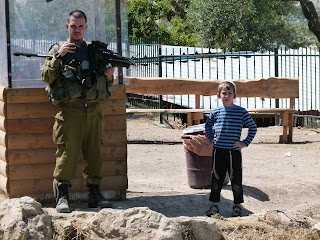I know many have seen the Naksa Day protests. We were in Deir Istiya in the afternoon visiting with Amal’s family. We did participate in Beit Ummar’s demonstration commemorating the Naksa on Saturday.
It was relatively calm, although the amount of soldiers was excessive. They attempted to arrest a young Palestinian, but internationals prevented his arrest. The soldiers did little to follow up. When they began pushing the protest, we all sit down, which is the picture above. In Qalandia, the checkpoint near Ramallah, the army’s force against the protest was intense. We were not there but have talked to others who were. If interested, Joseph Dana wrote about his eyewitness account in contrast to the major media reports. Joseph Dana is a well-known blogger here and internationally about his reports on what is happening here.
The other day in Jerusalem, the Friday before the Naksa, there was increased presence of the army at the gates of the Old City—only in the areas where Muslims enter.

Because of this, many were forced to pray, either in the street or outside the walls of the old city.
All in all this is a place of struggle and inspiration. All of which makes what I’m seeing heartbreaking and enchanting, respectively.
There are many stories of beautiful resistance, other than the demonstrations. Above is a good example of how Palestinians do not allow the Israeli army to change their purpose. They are blocked by Israel’s apartheid policies and they find an alternative. It’s inspiring.
The Tent of Nations is another place that shows the resistance of living.
The farmers owning the land have papers going back over 100 years and from three different governments. The Israeli’s keep trying to confiscate the land and doing everything they can to get the family to leave. They have cut off electricity, water, blocked and destroyed the roads to his home.
They have started a summer camp for children from the refugee camps, classes for women and agricultural classes.
One of the great unspoken effects of the occupation is the loss of a whole way of life here. In areas that were predominantly farming and agricultural communities, it is almost none existent as Israel has seized so much of the farmland and basically destroyed the entire agricultural economy. So, once where fruit was a major source of income, Palestinians have to buy produce from Israel in order to feed their families. The classes are open to any Palestinian in the surrounding villages. It’s an interesting merging of Palestinian resistance with international support. Below is a picture of the compost toilets that some German volunteers built. (for jorj J )
All of the buildings, of course, are slated for demolition, since the family cannot get any building permits for structures on the land. Occasionally the army comes in and destroys the structures, including tents, since they say they are illegal.
Am headed out now, so will hopefully be able to write a bit more this evening. I am learning much, sometimes more than I think my heart can hold, but once I think it is too much, I see examples of such heroism and inspiration, that it knocks down my own internal resistance and creates more capacity. Of all of the limited experiences I have had, Palestine is a place that one catches much courage….













